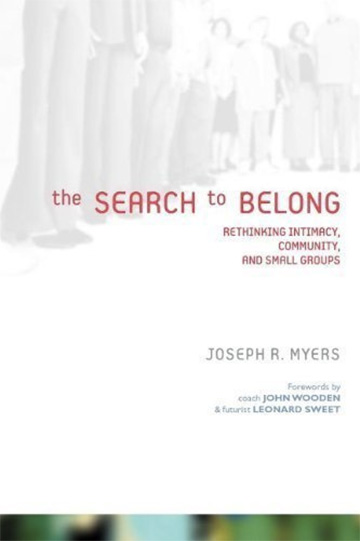
Synopsis
Overall Rating
Final Thoughts
Year Published
2003
Authors
Topics
Synopsis
Final Thoughts
Overall Rating
Why is it that in the most connected time in history, more people feel alone than ever? Why are churches all across the country finding that their congregations aren’t what they expected/desired them to be? Why, with all the small group programs, is the level of commitment and intimacy between those within the church still at what some would see as a superficial level? Myers answers all these questions and more in, The Search to Belong.
While this book is targeted more towards church leaders wishing to help “fix” their small groups, it serves wonderfully as a book for everyone. There’s nothing more fundamental to one’s life than wanting to belong- to feel a part of something, known, loved. And yet, more people than ever are expressing how alone they feel. Many go to church and are made to feel like they don’t belong. The one place that is supposed to call everyone to belong is the place that most often tells many people they don’t belong, often without meaning to.
The problems lie in a false understanding of what it means to belong, Myers asserts. He shows that there are four “spaces” in which we belong/relate to others. (going in both directions). Public belonging includes groups that relate/belong together based on outside influences (such as a sports team, or work). Social groups involve those who we allow to see us as friends, but aren’t quite personal with. We share more things in common than public groups, but just enough to decide if we want to keep people in the social group or move them into the personal group. Personal belonging takes place at a level where we share personal information with each other, and trust that it won’t betray us. But there’s a limit. We don’t (shouldn’t) share things that would either make ourselves or the other uncomfortable. The last space to belong is intimate. This isn’t reserved exclusively for physical intimacy but is the place where you can be 100% open and vulnerable (share what Myers calls the “naked” experiences) without fear of judgment or being made uncomfortable (or making the other uncomfortable).
The problem is that we tend to over emphasize the personal/intimate spaces over the public/social. Nobody doubts that belonging to a sports team, or work is unimportant, but we tend to think that the ultimate is intimate belonging. We want to be able to share personal things with everyone. And this is especially true within the church. We expect all small groups to be this place of 100% openness, sharing all things to everyone there without feeling ashamed. But that’s just not how life works.
Myers shows how we need to have a certain number of each type of belonging. We need to the most people in public belonging, and the least in intimate (with varying levels between). When we try to force too many people into a space, it isn’t healthy. There is a disconnect. It makes them feel alone and like they don’t belong because it’s not where they are supposed to be.
Not only does the church overemphasize unhealthy belonging, it doesn’t allow it to happen naturally. Ever notice how some of your best friends just kinda happened? It’s because relationships and belonging occur naturally. They can’t be forced. It has to be something that develops. Creating small groups and putting people in them, forcing people to give more commitment than they want, and forcing people to share things they wouldn’t normally won’t do anything than alienate them in most cases. It’s not going to foster a community, but it’s going to tear the community apart-one person at a time. The church also is usually unwilling to allow people to belong at the level they feel comfortable. If you’re not intimate with the church or other members you typically aren’t considered to belong. If you don’t attend every event, every week, you’re on the outside, just kind hanging out. But you’re not a “part” of the church. Where is the place for people who just want to belong publicly or socially? Jesus allowed people to do this. He only had 12 personal belongers and even fewer intimate ones. Why do we expect everyone to be personal or intimate, but not follow Christ’s example of healthy definitions of spaces and those who belong in each?
For individuals, we often do the same thing. We try to force our public/social relationships into personal/intimate relationships because that’s what we often see as more “real”. That’s not the case. We need relationships where people don’t know everything. We need relationships where we are connected by something outside our control. It doesn’t mean our relationship is fake, it just means it’s public. We don’t invite each other over, we don’t talk about personal things. We keep it to the matter at hand. That’s healthy. In this, we often try to hold on to public (or even social) relationships when they’re gone because we’re afraid to lose it. We think that all our friends from school or our old job should continue to be our friends, but that’s not the case. Sometimes those relationships are just for a time, brought by certain circumstances. We enjoy them and learn from them whilst they last, but we have to be okay with letting them go when the time comes.
Ultimately, if you struggle with feeling like you don’t belong (be it in the church or outside), your church is struggling with small groups, or you just want a better understanding of relationships and how different ones need to function, I definitely recommend reading this book. It’s insightful and moving.




